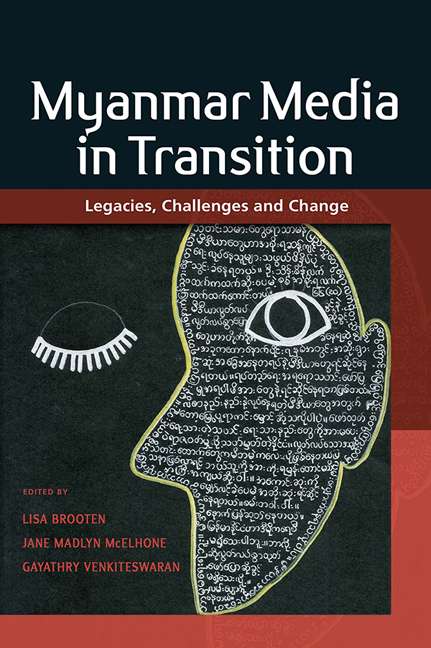Book contents
- Frontmatter
- Contents
- Contributors and Editors
- Burma or Myanmar? A Note on Terminology
- 1 Introduction: Myanmar Media Historically and the Challenges of Transition
- Part I Structural Constraints and Opportunities
- Part II Journalism in Transition
- Part III Creative Expression
- Part IV Society and Media
- 18 The Tea Shop Meets the 8 O'clock News: Facebook, Convergence and Online Public Spaces
- 19 From Blogging to Digital Rights: Telecommunications Reform in Myanmar
- 20 Counter-Narratives: Myanmar's Digital Media Activists
- Epilogue: Media Studies in Myanmar – Where Do We Go from Here?
- Index
19 - From Blogging to Digital Rights: Telecommunications Reform in Myanmar
from Part IV - Society and Media
Published online by Cambridge University Press: 07 September 2019
- Frontmatter
- Contents
- Contributors and Editors
- Burma or Myanmar? A Note on Terminology
- 1 Introduction: Myanmar Media Historically and the Challenges of Transition
- Part I Structural Constraints and Opportunities
- Part II Journalism in Transition
- Part III Creative Expression
- Part IV Society and Media
- 18 The Tea Shop Meets the 8 O'clock News: Facebook, Convergence and Online Public Spaces
- 19 From Blogging to Digital Rights: Telecommunications Reform in Myanmar
- 20 Counter-Narratives: Myanmar's Digital Media Activists
- Epilogue: Media Studies in Myanmar – Where Do We Go from Here?
- Index
Summary
The story of the Myanmar ICT for Development Organisation (MIDO) is closely related to the rise of blogging, which became popular in the country in the mid 2000s. Despite poor internet connections — which were mainly accessed at cyber cafes — and high levels of state surveillance, blogging offered individuals a platform to own their content and for expression, whether to discuss politics, social development or other personal interests like food and fashion. One of the well-known bloggers was Nay Phone Latt — now an elected member of the Yangon regional parliament for the National League for Democracy (NLD) — who was keen on creative writing as well as political commentary. Together, we formed the Myanmar Bloggers Society in 2007 and conducted basic training and workshops for start-ups and the blogging community.
Our first major public event in August 2007 was themed “We Blog, We Unite”, and we were able to attract about three hundred participants and private sponsors. A month later, the Saffron Revolution unfolded, and some of the bloggers and citizen journalists in the country, including Nay Phone Latt, wrote about the political situation and uploaded videos and footage of eyewitness accounts to the internet. These were shared by other media outlets and by individuals with their community members (OpenNet Initiative 2012). Because of this, the bloggers and citizen journalists became targets of the government, and some were eventually arrested. So, in the span of a month, the bloggers went from being popular to being avoided by everyone, as people were afraid and would not talk to us. In January 2008 Nay Phone Latt was arrested and charged under three different laws, including the 2004 Electronic Transactions Law, and sentenced to twenty years imprisonment. We had to stop our public activities because we thought it would be dangerous for us. We channelled our work to quietly supporting activists and journalists to develop their technological capabilities.
In 2011 the quasi-civilian government of President Thein Sein announced the political opening of Myanmar, and in January 2012 Nay Phone Latt was released as part of an amnesty for political prisoners (CPJ 2012). We came together again, but this time we shifted our focus from merely promoting blogs to advocating for wider digital rights.
- Type
- Chapter
- Information
- Myanmar Media in TransitionLegacies, Challenges and Change, pp. 366 - 376Publisher: ISEAS–Yusof Ishak InstitutePrint publication year: 2019



